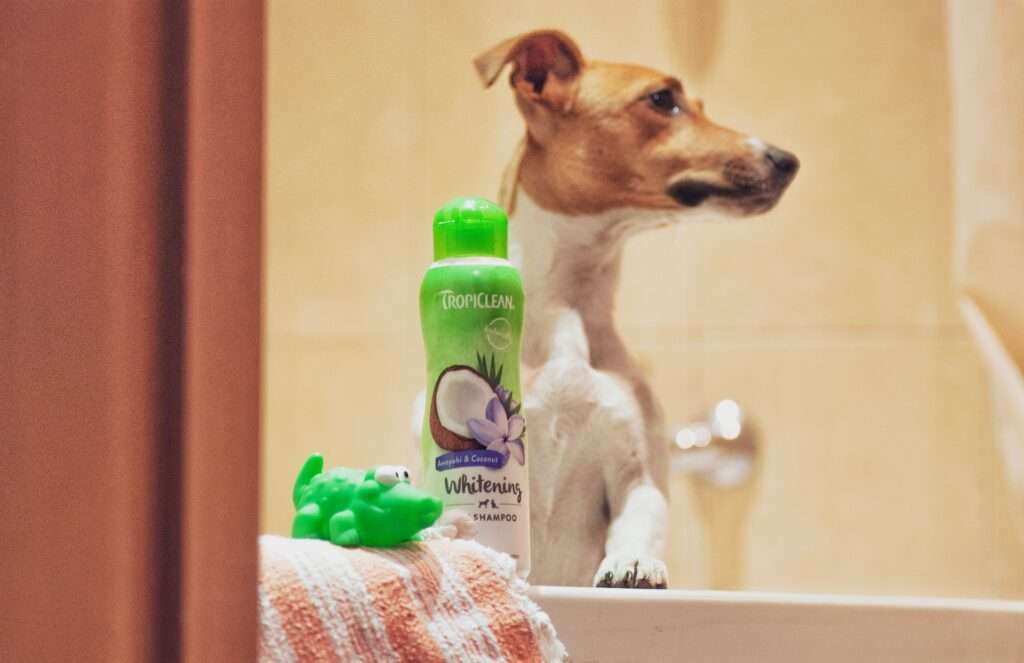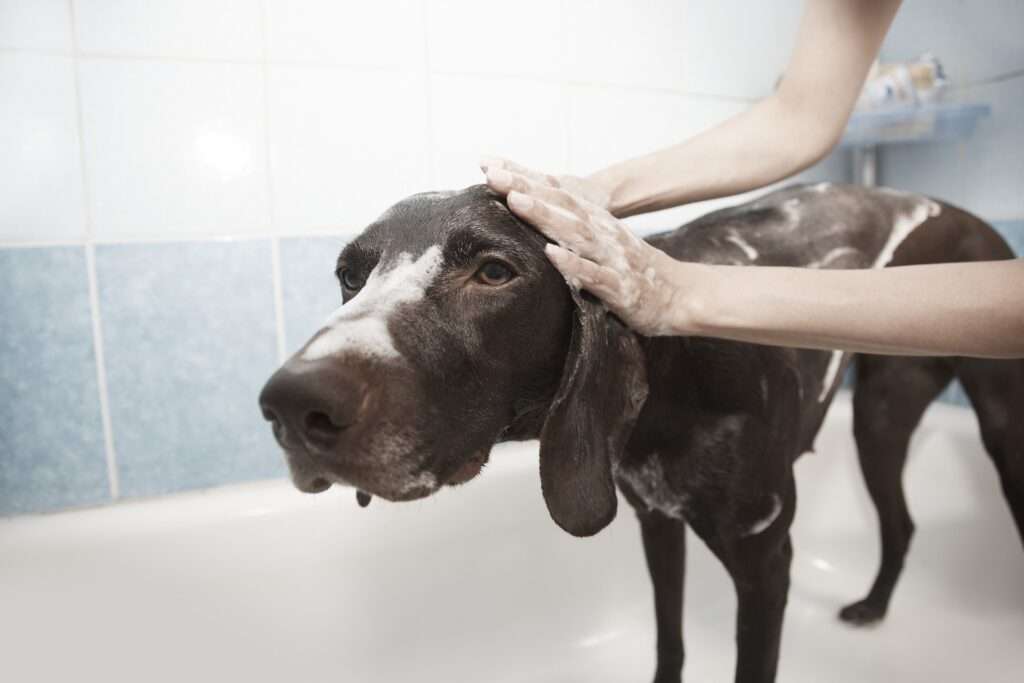No Dog Shampoo? What Can I Use Instead to Keep My Pup Clean?
As a dog owner, you know that bath time is an important part of keeping your furry friend healthy and clean. But what happens when you reach for the dog shampoo bottle and realize it’s empty? Don’t worry, we’ve got you covered.
In this comprehensive guide, we’ll explore alternative options for when you don’t have dog shampoo on hand, as well as homemade dog shampoo recipes and tips for bathing your dog without shampoo.
Why use dog shampoo?

Using a shampoo specifically formulated for dogs is essential for maintaining their overall health and wellbeing. While it may be tempting to use your own shampoo or soap when you’re in a pinch, it can be harmful to your dog’s skin and coat.
Dog shampoo is specially designed to meet the unique needs of a dog’s skin and coat. Unlike human shampoos, dog shampoos are formulated with a pH balance that is appropriate for a dog’s skin. This is important because a dog’s skin has a different pH level than human skin, and using the wrong type of shampoo can cause skin irritation, dryness, and other issues.
Additionally, dog shampoos are often formulated with natural ingredients that are safe for dogs to ingest if they happen to lick their fur during or after bathing. Human shampoos, on the other hand, can contain ingredients that are toxic to dogs if ingested.
In summary, using dog shampoo is crucial for maintaining your dog’s skin and coat health. While it may be tempting to use a human shampoo in a pinch, it’s important to always use a shampoo specifically formulated for dogs to avoid causing harm to your furry friend.
Understanding your dog’s skin and coat
To fully appreciate why using dog shampoo is so important, it’s essential to understand the unique characteristics of a dog’s skin and coat.
A dog’s skin is more delicate and sensitive than human skin, and it’s also thinner. This means that a dog’s skin is more susceptible to irritation and injury. Additionally, dogs have more hair follicles and sebaceous glands than humans, which can make their skin more prone to developing rashes, hot spots, and other skin conditions.
A dog’s coat is also different from human hair. A dog’s coat is made up of two layers: an outer layer of guard hairs that provide protection and insulation, and an undercoat that helps regulate body temperature. The undercoat can become matted and tangled if not properly cared for, leading to discomfort and even skin infections.
Using a shampoo specifically formulated for dogs is important because it takes into account the unique characteristics of a dog’s skin and coat. Dog shampoos are designed to be gentle on the skin while effectively removing dirt, debris, and oils from the coat. They also help maintain the natural oils in a dog’s coat, which can help prevent skin irritation and dryness.
Alternative options for when you don’t have dog shampoo

While using dog shampoo is always the best option for your dog’s health, there may be times when you don’t have any on hand. In those situations, there are several alternative options that can be used in a pinch.
One option is to use baby shampoo. Baby shampoo is often gentle and mild, which makes it a suitable alternative to dog shampoo. However, it’s important to read the label carefully to ensure that it doesn’t contain any ingredients that could be harmful to dogs.
Another option is to use dish soap. Dish soap can be effective at removing dirt and debris from a dog’s coat, but it should only be used as a last resort. Dish soap can strip a dog’s coat of its natural oils, leading to dryness and irritation.
Lastly, you can try using a vinegar and water solution as a natural alternative to dog shampoo. Mix equal parts water and vinegar, apply it to your dog’s coat, and then rinse it off with warm water. Vinegar can help remove dirt and odors from a dog’s coat, and it’s also a natural disinfectant. However, it’s important to be cautious when using vinegar on a dog’s skin, as it can be irritating if not diluted properly.
While these alternative options can be used in a pinch, it’s important to remember that using dog shampoo is always the best option for your dog’s health. If you find yourself frequently running out of dog shampoo, it may be a good idea to stock up to ensure that you always have it on hand when you need it.
Homemade dog shampoo recipes
If you prefer to use natural products on your dog, or if you find yourself frequently running out of dog shampoo, you may want to try making your own. Here are three simple homemade dog shampoo recipes:
Oatmeal and Lavender Shampoo:
- 1 cup of oatmeal
- 1 tablespoon of lavender essential oil
- 1 cup of water
Blend the oatmeal into a fine powder, then mix in the lavender essential oil and water. Apply the mixture to your dog’s coat, massaging it in well, and then rinse with warm water.
Apple Cider Vinegar and Baking Soda Shampoo:
- 1 cup of baking soda
- 1/4 cup of apple cider vinegar
- 1 cup of water
Mix the baking soda and water until it forms a paste, then add the apple cider vinegar. Apply the mixture to your dog’s coat, being careful to avoid the eyes and ears, and then rinse with warm water.
Coconut Oil and Aloe Vera Shampoo:
- 1 cup of coconut oil
- 1/2 cup of aloe vera gel
- 1 cup of water
Mix the coconut oil and aloe vera gel together until they are well combined, then add the water. Apply the mixture to your dog’s coat, massaging it in well, and then rinse with warm water.
It’s important to remember that while these homemade dog shampoo recipes use natural ingredients, it’s still important to be cautious when using them on your dog’s skin. Always test a small patch of skin first, and discontinue use if your dog experiences any adverse reactions.
Tips for bathing your dog without shampoo
If you find yourself without dog shampoo and don’t want to use an alternative option, there are still ways to keep your dog clean and healthy. Here are some tips for bathing your dog without shampoo:
- Use a damp cloth or sponge to wipe down your dog’s fur. This can help remove dirt and debris, and is especially useful for spot cleaning.
- Use a dry shampoo powder. Dry shampoo powders are designed to absorb oils and odors from a dog’s coat, and can be a good alternative to traditional shampoo.
- Brush your dog’s coat regularly. Brushing your dog’s coat can help remove dirt, debris, and loose fur, and can help distribute natural oils throughout their coat.
- Use water-only baths. If your dog doesn’t have any skin conditions or allergies, a water-only bath can still be effective at removing dirt and debris from their coat.
In summary, while using dog shampoo is always the best option for maintaining your dog’s health and wellbeing, there are alternative options and homemade dog shampoo recipes that can be used in a pinch. And if you find yourself without any shampoo, there are still ways to keep your dog clean and healthy.
Waterless dog shampoo
If you’re short on time or don’t have access to water, waterless dog shampoo can be a lifesaver. Waterless dog shampoo is a spray or foam that can be applied directly to your dog’s coat and massaged in, without the need for water.
Not only is waterless dog shampoo convenient, but it can also be a great option for dogs who don’t enjoy bath time. Some dogs may find baths stressful or uncomfortable, and waterless dog shampoo can be a great alternative.
There are many brands of waterless dog shampoo available, each with their own benefits and ingredients. Some popular brands include Begley’s Natural No Rinse Shampoo, Burt’s Bees Waterless Shampoo, and Wahl Waterless No Rinse Shampoo.
When using waterless dog shampoo, it’s important to follow the instructions carefully and massage the product thoroughly into your dog’s coat. While waterless dog shampoo is a great option for keeping your dog clean between baths, it’s still important to give your dog a full bath with traditional shampoo periodically.
How to choose the right dog shampoo
Choosing the right dog shampoo can be overwhelming with so many options available. Here are some factors to consider when selecting a dog shampoo:
- Skin sensitivity: Dogs with sensitive skin or allergies may need a specific type of shampoo that is gentle and fragrance-free.
- Coat type: Dogs with long, thick coats may need a different shampoo than those with short, thin coats.
- Purpose: There are different shampoos designed for specific purposes, such as flea and tick prevention, conditioning, or deodorizing.
- Ingredients: Look for shampoos with natural and safe ingredients that are free from harmful chemicals and toxins.
- Brand reputation: Do some research on the brand and read reviews from other dog owners to ensure that the shampoo is high quality and effective.
Conclusion
Keeping your dog clean and healthy is an important part of pet ownership, but sometimes you may find yourself without dog shampoo. In these situations, there are alternative options and homemade dog shampoo recipes that can be used.
However, it’s important to always consider your dog’s skin sensitivity and coat type when selecting a shampoo, and to choose a high-quality product with natural and safe ingredients. By following these tips, you can ensure that your dog’s bath time is both effective and enjoyable.
Remember to also monitor your dog’s skin and coat for any signs of irritation or dryness, and consult with your veterinarian if you have any concerns. With the right care and attention, your furry friend can enjoy a happy and healthy life.
Frequently Asked Questions
Q: Why use dog shampoo?
A: Using a shampoo specifically formulated for dogs is essential for maintaining their overall health and wellbeing. Dog shampoos are specifically designed to maintain the pH balance of your dog’s skin and coat, which is different from human skin. Using the wrong shampoo or soap can cause skin irritation, dryness, and other issues.
Q: What can I use to bathe my dog if I don’t have dog shampoo?
A: There are several alternatives to dog shampoo that you can use to bathe your dog, including waterless dog shampoo, homemade dog shampoo, baby shampoo, and dish soap. However, it’s important to note that these alternatives may not be as effective as dog shampoo and may not be suitable for all dogs.
Q: How do I choose the right dog shampoo?
A: When choosing a dog shampoo, it’s important to consider your dog’s skin type, coat type, and any skin or coat issues they may have. Look for shampoos that are specifically formulated for your dog’s needs and avoid shampoos that contain harsh chemicals or fragrances.
Q: Can I use human shampoo on my dog?
A: No, you should not use human shampoo on your dog. Human shampoos are not designed for use on dogs and can cause skin irritation, dryness, and other issues. Additionally, human shampoos may contain ingredients that can be toxic to dogs.
Q: How often should I bathe my dog?
A: The frequency of bathing your dog depends on their breed, coat type, and activity level. Generally, most dogs need to be bathed every 3-4 months. However, dogs that spend a lot of time outdoors or have skin issues may need to be bathed more frequently.
Q: Can I use conditioner on my dog?
A: Yes, you can use conditioner on your dog, but make sure to use a conditioner that is specifically formulated for dogs. Dog conditioners help to moisturize and soften your dog’s coat, making it easier to brush and detangle.
Q: Can I use flea shampoo on my dog?
A: Yes, you can use flea shampoo on your dog, but make sure to follow the instructions carefully and avoid getting the shampoo in your dog’s eyes or mouth. Flea shampoos are designed to kill fleas and other parasites on your dog’s skin and coat.
Q: Can I use dog shampoo on my cat?
A: No, you should not use dog shampoo on your cat. Cat shampoos are specifically formulated for cats and have a different pH balance than dog shampoos. Using dog shampoo on your cat can cause skin irritation, dryness, and other issues.
Q: Can I use dog shampoo on a puppy?
A: Yes, you can use dog shampoo on a puppy, but make sure to choose a shampoo that is specifically formulated for puppies. Puppy shampoos are gentler and less harsh than adult dog shampoos, making them ideal for young and sensitive skin.
Q: Can I use human hair conditioner on my dog?
A: No, you should not use human hair conditioner on your dog. Human hair conditioners are not designed for use on dogs and can cause skin irritation, dryness, and other issues. Additionally, human hair conditioners may contain ingredients that can be toxic to dogs.




